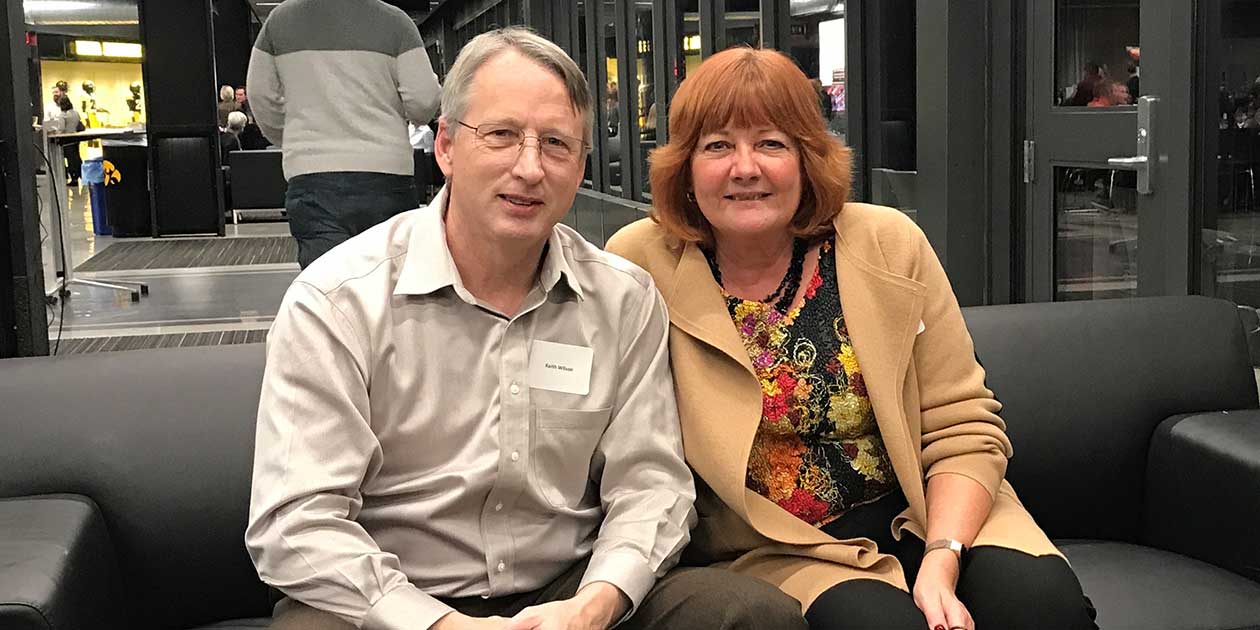From Sarcoma Diagnosis to Grateful Patient

When Keith Wilson (81BBA), of Iowa City, was touring the USS Iowa battleship with thousands of Hawkeye fans prior to the 2016 Rose Bowl, he received a phone call that changed his life.
He had cancer.
"It's amazing for a ship that big that there is no place to sit down," says Keith. "It was a stunner."
After cheering on the Hawkeyes and coming back to Iowa City, Keith and his wife, Sandy Holdorf Wilson (83BBA), entrusted University of Iowa Holden Comprehensive Cancer Center with his care—specifically, orthopedic surgeon Benjamin Miller (03MD, 03F, 12MS) and Mohammed Milhem, a medical oncologist who holds the title of Holden Chair of Experimental Therapeutics.
"When I walked into my appointment, I knew that Ben liked to do radiation first and surgery later," said Keith, who was diagnosed with sarcoma, a cancer that develops in the bones and soft tissues. "I was fine with taking his approach, but during my appointments, I was asked if I would consider participating in a clinical trial."
Clinical trials are one way for medical professionals such as Drs. Miller and Milhem to pursue new therapies and advance the treatments of cancer. Holden Comprehensive Cancer Center is a National Cancer Institute-designed cancer center. Iowa is able to provide patients, such as Keith, access to new drugs that have the potential to improve outcomes and, one day, cure sarcoma.
Holden Comprehensive Cancer Center is a Sarcoma Alliance-designated sarcoma center, the only medical institution in Iowa that provides adult sarcoma clinical trials, and Keith feels lucky to have had this leading medical institution in his hometown. He is the fifth participant in a phase one clinical trial at Holden that was patterned after successful results from using intratumoral TVEC, or Talimogene laherparepvec, to treat melanoma patients.
"The treatment plan was the same for Keith—radiation first and then removal of the tumor," says Dr. Miller. "In addition, we did an injection of TVEC into the tumor every week. Our hope was that once TVEC was injected into the tumor, the TVEC virus would replicate, break the tumor cells open, and release more of the TVEC virus. The virus particle also has a white blood cell stimulant molecule attached to it so that immune cells would be attracted to the tumor site. Our hope was that immune cells would arrive at the site of the tumor and teach the body that the tumor shouldn't be there. We're still looking at longer term outcomes, but we know that the side effects were about the same as if you had radiation treatments."
For more than three months, Keith made weekly visits to Holden to get a direct injection of TVEC into his tumor, which was the size of a tennis ball and was located on the side of his knee. Radiation treatments, which were five days a week for five weeks, soon complemented the clinical trial. While Keith had expected side effects—including frequent losses of energy—he also became anemic, lost 20 pounds, and struggled with high blood pressure.
In April 2016, Keith had surgery to remove the tumor. "After I had surgery, I had this big leg splint on because I wasn't able to flex my knee," says Keith. "I started to walk a little to get some exercise, and that's when people started asking questions. Only our family knew about the diagnosis. It was kind of my cancer coming out party."
Now, more than five years later, Keith has no lasting evidence of the disease in his body and has yearly check-ups with Dr. Miller. The Wilsons continue to be extremely grateful for the care Keith received at Holden Comprehensive Cancer Center.
"Ben saw me at my lowest, and he got the job done," says Keith. "If we hadn't done the clinical trials, we wouldn't have had the time we had with the doctors and staff. It's phenomenal to see what he's done to help people maintain function and get sarcoma out of the body. He's done some tremendous things."
That's why the Wilsons made a gift to support sarcoma research at Iowa, and their contributions are helping fund the next phase of the TVEC clinical trial in which Keith participated. The Holden sarcoma research team learned, in phase one, that a higher dose of TVEC may be more effective because sarcomas are large tumors. This next phase of the trial will inject patients with a higher dose of TVEC in tandem with standard preoperative radiation.
"Keith and Sandy's donation will hopefully allow us to learn more about what is happening to immune cells that fight these tumors," says Dr. Miller. "Learning more about these tumors may lead to more knowledge, changes in treatments, and help us discover what other drugs work best in combination with TVEC injection. It's something we wouldn't be able to do without support like this."
You can join the Wilsons and support cancer research at Iowa today!
